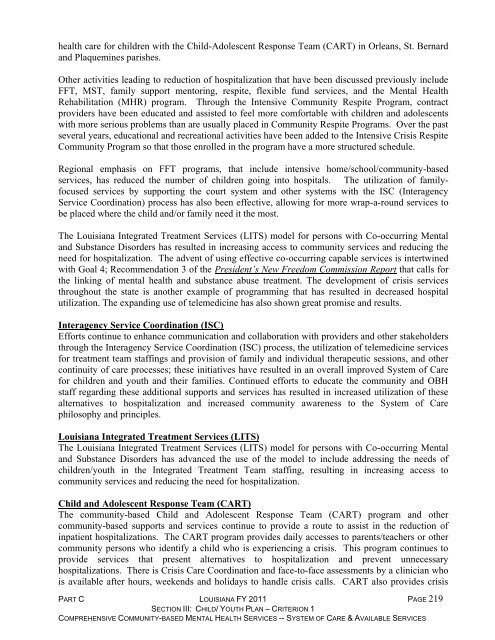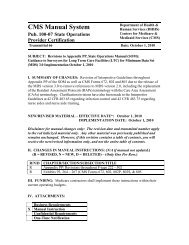LOUISIANA Community Mental Health Services Block Grant ...
LOUISIANA Community Mental Health Services Block Grant ...
LOUISIANA Community Mental Health Services Block Grant ...
You also want an ePaper? Increase the reach of your titles
YUMPU automatically turns print PDFs into web optimized ePapers that Google loves.
health care for children with the Child-Adolescent Response Team (CART) in Orleans, St. Bernard<br />
and Plaquemines parishes.<br />
Other activities leading to reduction of hospitalization that have been discussed previously include<br />
FFT, MST, family support mentoring, respite, flexible fund services, and the <strong>Mental</strong> <strong>Health</strong><br />
Rehabilitation (MHR) program. Through the Intensive <strong>Community</strong> Respite Program, contract<br />
providers have been educated and assisted to feel more comfortable with children and adolescents<br />
with more serious problems than are usually placed in <strong>Community</strong> Respite Programs. Over the past<br />
several years, educational and recreational activities have been added to the Intensive Crisis Respite<br />
<strong>Community</strong> Program so that those enrolled in the program have a more structured schedule.<br />
Regional emphasis on FFT programs, that include intensive home/school/community-based<br />
services, has reduced the number of children going into hospitals. The utilization of familyfocused<br />
services by supporting the court system and other systems with the ISC (Interagency<br />
Service Coordination) process has also been effective, allowing for more wrap-a-round services to<br />
be placed where the child and/or family need it the most.<br />
The Louisiana Integrated Treatment <strong>Services</strong> (LITS) model for persons with Co-occurring <strong>Mental</strong><br />
and Substance Disorders has resulted in increasing access to community services and reducing the<br />
need for hospitalization. The advent of using effective co-occurring capable services is intertwined<br />
with Goal 4; Recommendation 3 of the President’s New Freedom Commission Report that calls for<br />
the linking of mental health and substance abuse treatment. The development of crisis services<br />
throughout the state is another example of programming that has resulted in decreased hospital<br />
utilization. The expanding use of telemedicine has also shown great promise and results.<br />
Interagency Service Coordination (ISC)<br />
Efforts continue to enhance communication and collaboration with providers and other stakeholders<br />
through the Interagency Service Coordination (ISC) process, the utilization of telemedicine services<br />
for treatment team staffings and provision of family and individual therapeutic sessions, and other<br />
continuity of care processes; these initiatives have resulted in an overall improved System of Care<br />
for children and youth and their families. Continued efforts to educate the community and OBH<br />
staff regarding these additional supports and services has resulted in increased utilization of these<br />
alternatives to hospitalization and increased community awareness to the System of Care<br />
philosophy and principles.<br />
Louisiana Integrated Treatment <strong>Services</strong> (LITS)<br />
The Louisiana Integrated Treatment <strong>Services</strong> (LITS) model for persons with Co-occurring <strong>Mental</strong><br />
and Substance Disorders has advanced the use of the model to include addressing the needs of<br />
children/youth in the Integrated Treatment Team staffing, resulting in increasing access to<br />
community services and reducing the need for hospitalization.<br />
Child and Adolescent Response Team (CART)<br />
The community-based Child and Adolescent Response Team (CART) program and other<br />
community-based supports and services continue to provide a route to assist in the reduction of<br />
inpatient hospitalizations. The CART program provides daily accesses to parents/teachers or other<br />
community persons who identify a child who is experiencing a crisis. This program continues to<br />
provide services that present alternatives to hospitalization and prevent unnecessary<br />
hospitalizations. There is Crisis Care Coordination and face-to-face assessments by a clinician who<br />
is available after hours, weekends and holidays to handle crisis calls. CART also provides crisis<br />
PART C <strong>LOUISIANA</strong> FY 2011 PAGE 219<br />
SECTION III: CHILD/ YOUTH PLAN – CRITERION 1<br />
COMPREHENSIVE COMMUNITY-BASED MENTAL HEALTH SERVICES -- SYSTEM OF CARE & AVAILABLE SERVICES
















